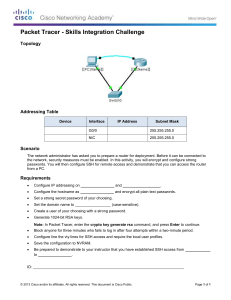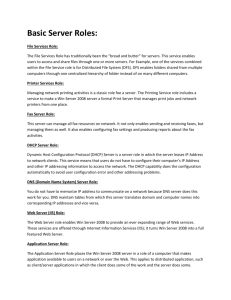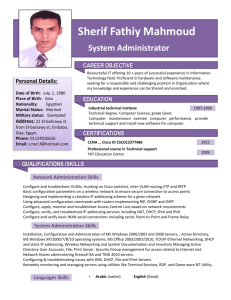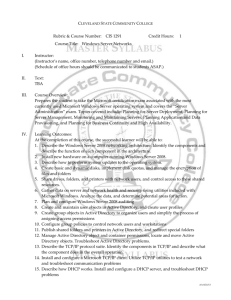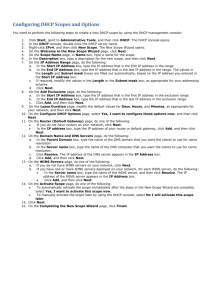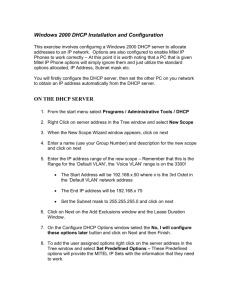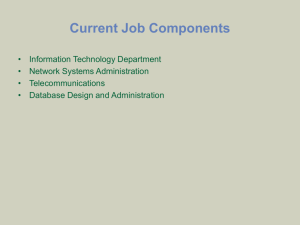413_OD_R2-April-2014
advertisement
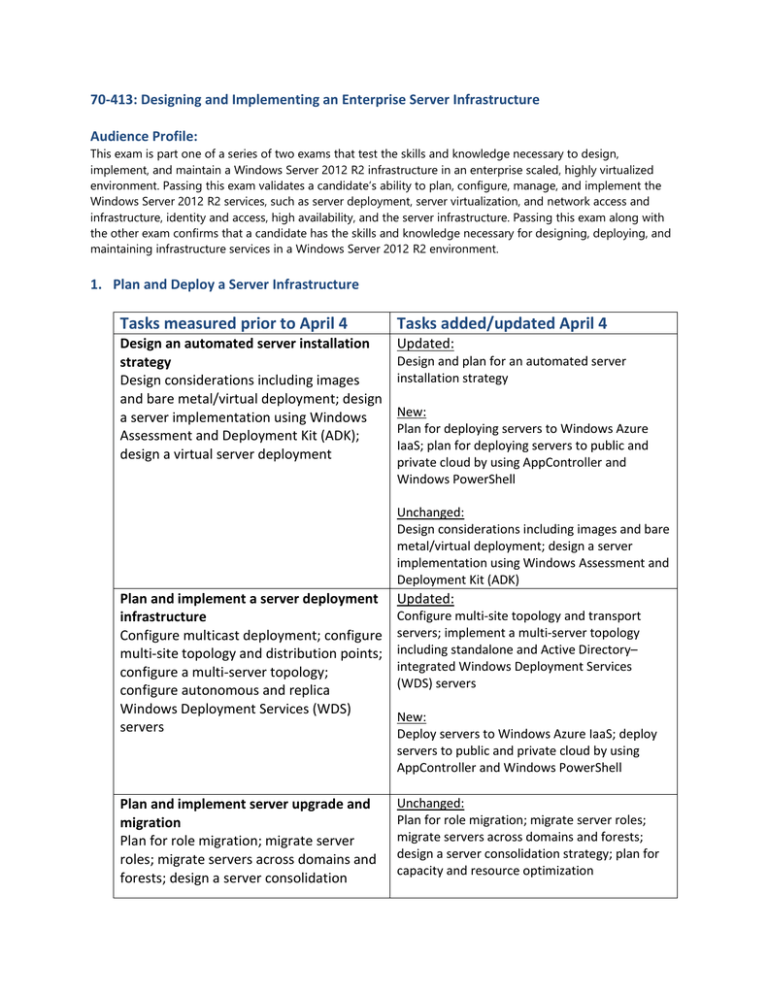
70-413: Designing and Implementing an Enterprise Server Infrastructure Audience Profile: This exam is part one of a series of two exams that test the skills and knowledge necessary to design, implement, and maintain a Windows Server 2012 R2 infrastructure in an enterprise scaled, highly virtualized environment. Passing this exam validates a candidate’s ability to plan, configure, manage, and implement the Windows Server 2012 R2 services, such as server deployment, server virtualization, and network access and infrastructure, identity and access, high availability, and the server infrastructure. Passing this exam along with the other exam confirms that a candidate has the skills and knowledge necessary for designing, deploying, and maintaining infrastructure services in a Windows Server 2012 R2 environment. 1. Plan and Deploy a Server Infrastructure Tasks measured prior to April 4 Tasks added/updated April 4 Design an automated server installation strategy Design considerations including images and bare metal/virtual deployment; design a server implementation using Windows Assessment and Deployment Kit (ADK); design a virtual server deployment Updated: Design and plan for an automated server installation strategy New: Plan for deploying servers to Windows Azure IaaS; plan for deploying servers to public and private cloud by using AppController and Windows PowerShell Unchanged: Design considerations including images and bare metal/virtual deployment; design a server implementation using Windows Assessment and Deployment Kit (ADK) Plan and implement a server deployment infrastructure Configure multicast deployment; configure multi-site topology and distribution points; configure a multi-server topology; configure autonomous and replica Windows Deployment Services (WDS) servers Updated: Plan and implement server upgrade and migration Plan for role migration; migrate server roles; migrate servers across domains and forests; design a server consolidation Unchanged: Plan for role migration; migrate server roles; migrate servers across domains and forests; design a server consolidation strategy; plan for capacity and resource optimization Configure multi-site topology and transport servers; implement a multi-server topology including standalone and Active Directory– integrated Windows Deployment Services (WDS) servers New: Deploy servers to Windows Azure IaaS; deploy servers to public and private cloud by using AppController and Windows PowerShell strategy; plan for capacity and resource optimization Plan and deploy Virtual Machine Manager services Design Virtual Machine Manager service templates; define operating system profiles; configure hardware and capability profiles; manage services; configure image and template libraries; manage logical networks Updated: Plan and deploy profiles including operating system profiles, hardware and capability profiles, application profiles, and SQL profiles; plan and manage services including scaling out, updating, and servicing services; configure VMM libraries New: Plan and deploy services to non-trusted domains and workgroups Unchanged: Design Virtual Machine Manager service templates Plan and implement file and storage services Planning considerations include iSCSI SANs, Fibre Channel SANs, Virtual Fibre Channel, storage spaces, storage pools, and data de-duplication; configure the iSCSI Target server; configure the Internet Storage Name server (iSNS); configure Network File System (NFS); install Device Specific Modules (DSMs) Updated: Planning considerations including iSCSI SANs, Fibre Channel SANs, Virtual Fibre Channel, storage spaces, storage pools including tiered storage, and data de-duplication; configure Services for Network File System (NFS) New: Plan and implement SMB 3.0 based storage; plan for Windows Offloaded Data Transfer (ODX) Unchanged: Configure the Internet Storage Name server (iSNS) 2. Design and Implement Network Infrastructure Services Tasks measured prior to April 7 Tasks added/updated April 7 Design and maintain a Dynamic Host Configuration Protocol (DHCP) solution. Design considerations including a highly available DHCP solution including split scope, DHCP failover, and DHCP failover clustering, DHCP interoperability, and DHCPv6; implement DHCP filtering; implement and configure a DHCP Unchanged: Design considerations including a highly available DHCP solution including split scope, DHCP failover, and DHCP failover clustering, DHCP interoperability, and DHCPv6; implement DHCP filtering; implement and configure a DHCP management pack; maintain a DHCP database management pack; maintain a DHCP database Design a name resolution solution strategy. Design considerations including secure name resolution, DNSSEC, DNS Socket Pool, cache locking, disjoint namespaces, DNS interoperability, migration to application partitions, IPv6, Single-Label DNS Name Resolution, zone hierarchy, and zone delegation Design and manage an IP address management solution. Design considerations including IP address management technologies including IPAM, Group Policy based, and manual provisioning, and distributed vs. centralized placement; configure rolebased access control; configure IPAM auditing; migrate IPs; manage and monitor multiple DHCP and DNS servers; configure data collection for IPAM Updated: Design considerations including Active Directory integrated zones, DNSSEC, DNS Socket Pool, cache locking, disjoint namespaces, DNS interoperability, migration to application partitions, IPv6, Single-Label DNS Name Resolution, zone hierarchy, and zone delegation Updated: Design considerations including IP address management technologies including IPAM, Group Policy based, and manual provisioning, and distributed, centralized, hybrid placement, and database storage New: Integrate IPAM with Virtual Machine Manager (VMM) Unchanged: Configure role-based access control; configure IPAM auditing; migrate IPs; manage and monitor multiple DHCP and DNS servers; configure data collection for IPAM 3. Design and Implement Network Access Services Tasks measured prior to April 7 Tasks added/updated April 7 Design a VPN solution. Design considerations including certificate deployment, firewall configuration, client/site-to-site, bandwidth, protocol implications, connectivity to Windows Azure IaaS, and VPN deployment configurations using Connection Manager Administration Kit (CMAK) Design a DirectAccess solution. Design considerations including deployment, topology, migration from Forefront UAG, One Time Password (OTP), and use of certificates issued by enterprise Certificate Authority (CA) Unchanged: Design considerations including a highly available DHCP solution including split scope, DHCP failover, and DHCP failover clustering, DHCP interoperability, and DHCPv6; implement DHCP filtering; implement and configure a DHCP management pack; maintain a DHCP database Updated: Design considerations including Active Directory integrated zones, DNSSEC, DNS Socket Pool, cache locking, disjoint namespaces, DNS interoperability, migration to application partitions, IPv6, Single-Label DNS Name Resolution, zone hierarchy, and zone delegation Implement a scalable remote access solution. Configure site-to-site VPN; configure packet filters; implement packet tracing; implement multi-site Remote Access; configure Remote Access clustered with Network Load Balancing (NLB); configure DirectAccess Design a network protection solution. Design considerations including Network Access Protection (NAP) enforcement methods for DHCP, IPSec, VPN, and 802.1x, capacity, placement of servers, firewall, Network Policy Server (NPS), and remediation network New: Design a Web Application Proxy solution. Design considerations including planning for applications, authentication and authorization, Workplace Join, devices, multifactor authentication, multifactor access control, Single Sign On (SSO), certificates, planning access for internal and external clients Updated: Implement an advanced DirectAccess solution New: Configure multiple RADIUS server groups and infrastructure; configure Web Application Proxy for clustering Unchanged: Configure site-to-site VPN; configure packet filters; implement packet tracing; implement multi-site Remote Access; configure Remote Access clustered with Network Load Balancing (NLB) Updated: Design and implement a network protection solution. New: Configure NAP enforcement for IPsec and 802.1x; monitor for compliance Unchanged: Design considerations including Network Access Protection (NAP) enforcement methods for DHCP, IPSec, VPN, and 802.1x, capacity, placement of servers, firewall, Network Policy Server (NPS), and remediation network 4. Design and Implement an Active Directory Infrastructure (Logical) Tasks measured prior to April 7 Tasks added/updated April 7 Design a forest and domain infrastructure. Updated: Design considerations including multi-forest architecture, trusts, functional levels, domain upgrade, domain migration, forest restructure, Azure Active Directory, and DirSync Design considerations including multi-forest architecture, trusts, functional levels, domain upgrade, domain migration, forest restructure, and Hybrid Cloud services Implement a forest and domain infrastructure. Configure domain rename; configure Kerberos realm trusts; implement a domain upgrade; implement a domain migration; implement a forest restructure; deploy and manage a test forest including synchronization with production forests Design a Group Policy strategy. Design considerations including inheritance blocking, enforced policies, loopback processing, security, and WMI filtering, site-linked Group Policy Objects (GPOs), slow-link processing, group strategies, organizational unit (OU) hierarchy and Advanced Group Policy Management (AGPM) Design an Active Directory permission model. Design considerations including Active Directory object security and Active Directory quotas; customize tasks to delegate in Delegation of Control Wizard; deploy administrative tools on the client computer; delegate permissions on administrative users (AdminSDHolder); configure Kerberos delegation Unchanged: Configure domain rename; configure Kerberos realm trusts; implement a domain upgrade; implement a domain migration; implement a forest restructure; deploy and manage a test forest including synchronization with production forests Updated: Design considerations including inheritance blocking, enforced policies, loopback processing, security, and WMI filtering, sitelinked Group Policy Objects (GPOs), slowlink processing, group strategies, organizational unit (OU) hierarchy, Advanced Group Policy Management (AGPM), and Group Policy caching Updated: Customize tasks to delegate in Delegation of Control Wizard; plan for Kerberos delegation Unchanged: Design considerations including Active Directory object security and Active Directory quotas; deploy administrative tools on the client computer; delegate permissions on administrative users (AdminSDHolder) 5. Design and Implement an Active Directory Infrastructure (Physical) Tasks measured prior to April 7 Tasks added/updated April 7 Design an Active Directory sites topology. Design considerations including proximity of domain controllers, replication optimization, and site link; monitor and resolve Active Directory replication conflicts Updated: Identify and resolve Active Directory replication conflicts Design a domain controller strategy. Design considerations including global catalog, operations master roles, ReadOnly Domain Controllers (RODCs), partial attribute set and domain controller cloning Design and implement a branch office infrastructure. Design considerations including RODC, Universal Group Membership Caching (UGMC), global catalog, DNS, DHCP, and BranchCache; implement confidential attributes; delegate administration; modify filtered attributes set; configure Password Replication Policy; configure hash publication Updated: Design considerations including global catalog, operations master roles, Read-Only Domain Controllers (RODCs), partial attribute set, domain controller cloning, and domain controller placement Unchanged: Design considerations including RODC, Universal Group Membership Caching (UGMC), global catalog, DNS, DHCP, and BranchCache; implement confidential attributes; delegate administration; modify filtered attributes set; configure Password Replication Policy; configure hash publication
